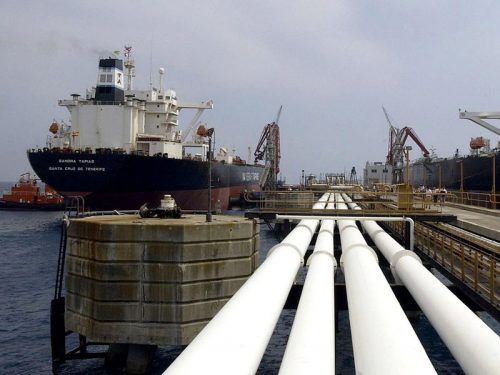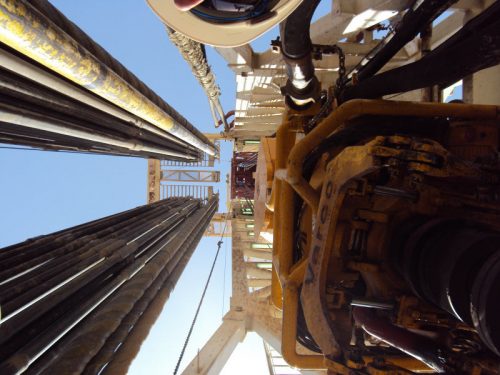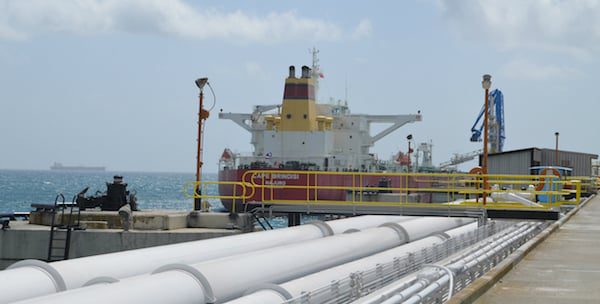Kurdistan’s oil exports from northern Iraq to Turkey are still suspended, despite the passage of more than a month since the cessation of flows from Kirkuk to the port of Ceyhan.
Iraqi sources revealed the reasons for the delay in resuming the export of Iraqi oil from the Turkish port of Ceyhan on the Mediterranean, pointing to the existence of “technical” problems between Baghdad and the Kurdistan Regional Government in northern Iraq.
On March 25, Turkey stopped shipping Iraqi Kurdistan’s oil to the port of Ceyhan, after an international arbitration decision obligated Ankara to pay compensation to Baghdad. For violating a 1973 pipeline agreement by allowing the export of KRG oil without Baghdad’s approval between 2014 and 2018.
Ceyhan pipeline
The oil pipeline that runs from the Iraqi region of Kirkuk to Ceyhan is the only export route for the crude produced by the oil fields in northern Iraq.
The Iraqi government and the Kurdistan Regional Government signed an interim agreement on April 4 that paves the way for the resumption of exports, but this has yet to materialize.
A spokesman for the Iraqi government, Basem Al-Awadi, said that the delay in resuming Kurdistan’s oil exports is strictly linked to the technical procedures that await settlement in accordance with the legal framework.
He added that the resolution of these technical issues “will only take a short period of time,” according to Argos Media.
The ruling prompted Turkey to stop Kurdistan’s oil exports, which are estimated at 450,000 barrels per day, equivalent to 0.5% of the world’s oil supply.
On March 25, Iraq said it had won the arbitration case, and according to a source familiar with the case; The court obligated Turkey to pay $1.5 billion to Iraq before interest in a ruling covering 2014-2018.
Settlement negotiations
Al-Awadi said that the Iraqi Federal Oil Marketing Company “SOMO” is in negotiations with “the companies responsible for exporting northern Iraq’s crude,” adding that the talks are “in line with the Iraqi Ministry of Oil and SOMO’s policy and official selling prices.”
The agreement between Baghdad and the KRG stipulates that the semi-autonomous Kurdistan’s oil will be jointly exported by the KRG’s Ministry of Natural Resources and SOMO.
The technical sticking points relate to SOMO’s new role as marketer of KRG crude, which will henceforth be subject to Baghdad’s official prices.
The deal also provided for the opening of an account in the Central Bank of Iraq for Kirkuk oil revenues, to be managed by the Kurdistan Regional Government but Baghdad would have access to monitor and review it.

Türkiye fined
Separately from the internal negotiations in Iraq, an arbitration court at the International Chamber of Commerce ordered Turkey to pay Baghdad $1.47 billion in compensation for breaching the pipeline deal.
But Ankara is still hesitating, waiting for an agreement on the payment and clarity on Iraq’s position regarding the second arbitration case, which was again brought by Baghdad, on the same issue of duration since 2018.
In response to a question about whether Iraq had received any guarantees from the Turkish side that Kurdistan’s oil exports would resume when Baghdad and Erbil finally finish their agreement, Al-Awadi said: “Ankara asked for a short period of time to examine the oil pipelines to ensure that they are not subjected to any damage due to the recent devastating earthquakes.” .
Turkey wants to settle another issue covering the period from 2018 onwards before the pipeline is reopened, and Al-Awadi indicated that Baghdad is in talks with the Ankara government in order to start exporting.
full storage
The suspension of shipments from the port of Ceyhan has cut off nearly 470,000 barrels per day (bpd) of Iraqi oil exports since late March—some 400,000 bpd of KRG crude normally flowing through the Kirkuk-Ceyhan pipeline along with an estimated 70 thousand barrels per day of Iraqi oil.
It has also forced field operators in the Kurdistan region such as London-listed Gulf Keystone Petroleum and Norway’s DNO to shut down or cut production sharply due to their limited storage capacity.
Forza Petroleum, which is based in Canada and operates the Hawler field, which has a production capacity of 15 thousand barrels per day in northern Iraq, confirmed that “its production is mostly suspended.”
The company said it was “keeping production at a reduced rate in some wells in order to protect artificial lift pumps as the oil is directed to storage.”
Forza added that it has no indication as to when the pipeline flow to Ceyhan will resume, stressing that the longer the uncertainty lasts, it will begin to consider laying off equipment and resources to reduce operating costs.

Reducing oil companies’ expenses
Gulf Keystone Petroleum hopes to resume exports from Kurdistan soon, but at the same time it is cutting spending.
The company’s CEO, John Harris, said that the company was on a healthier path until arbitration over the pipeline between Iraq and Turkey stopped the flows on March 25.
Gulf Keystone’s spending through the end of April was about $45 million, and total capital spending for 2023 is expected to be between $80 million and $85 million, compared to previous plans of $160-175 million.
The company is reconsidering its final 2022 dividend of $25 million, Energy Voice reported.
Harris said that Gulf Keystone was producing about 53,700 barrels per day until the exports stopped, and there were also plans to increase production with the SH-18 well, which is scheduled to start operating in the second quarter of the year.
related topics..
Also read..

Leave a Reply